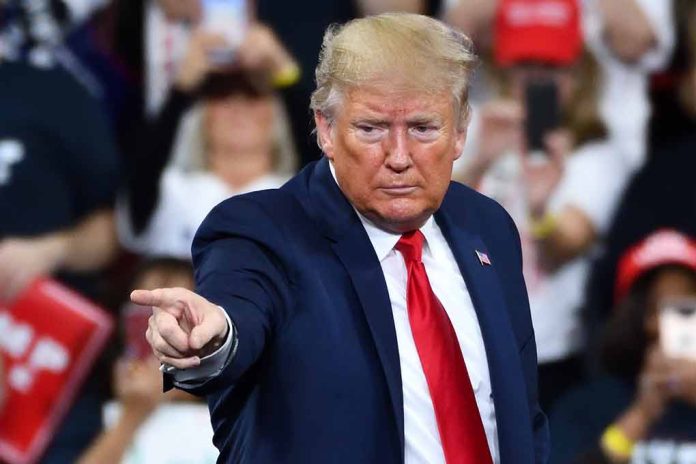
Donald Trump vows to fire federal employees who refuse to return to office full-time, challenging remote work trends.
At a Glance
- Trump threatens to dismiss federal workers who don’t return to in-office work
- He plans to challenge Biden administration’s telework agreement for federal employees
- Trump’s proposed Department of Government Efficiency aims to cut $2 trillion from federal budget
- Nearly half of the federal workforce is eligible for some form of remote work
- Implementing the proposal could result in over 1 million federal employees being fired
Trump’s Stance on Federal Employee Work Arrangements
Former President Donald Trump has ignited a fierce debate over federal workforce management by declaring his intention to terminate government employees who do not return to office-based roles. This bold stance directly challenges the flexible work environments that have become increasingly common since the COVID-19 pandemic.
Trump’s position emphasizes his belief that the physical presence of federal employees is crucial for maintaining operational efficacy and accountability. His remarks come at a critical juncture when organizations, particularly in the public sector, are reassessing long-term remote work policies.
President-elect Donald Trump said federal workers who don't want to work in the office will be fired, despite a union deal to allow federal workers to continue to telework into 2029. https://t.co/HIAhouEi77
— CBS News (@CBSNews) December 17, 2024
Challenging Biden Administration’s Telework Agreement
Central to Trump’s plan is his intent to challenge a labor contract approved by the Biden administration that permits remote work for thousands of federal employees. Trump criticized this agreement, stating, “It was like a gift to a union, and we’re going to obviously be in court to stop it.”
The telework agreement in question allows Social Security Administration employees to work in-office between two and five days per week, depending on their roles. This flexibility has become a contentious issue, with Trump viewing it as detrimental to government efficiency.
The Scope of Federal Remote Work
The federal government employs over 4 million people, with a significant portion eligible for some form of remote work. According to an Office of Management and Budget report, approximately 1.1 million federal employees are eligible for part-time remote work, with an additional 280,000 in fully remote positions. However Trump officially issued a warning to those working remote stating,”If people don’t come back to work, come back into the office, they’re going to be dismissed.”
This directive could potentially impact over 1 million federal employees if they do not comply with a five-day in-office requirement. Such a sweeping change raises concerns about potential brain drain and its impact on government operations.
The Department of Government Efficiency
Trump’s proposed Department of Government Efficiency, to be led by Elon Musk and Vivek Ramaswamy, aims to scrutinize work-from-home policies and cut $2 trillion from the federal budget. Musk and Ramaswamy argue that requiring federal employees to work in-office could lead to voluntary terminations, which they view positively, “Requiring federal employees to come to the office five days a week would result in a wave of voluntary terminations that we welcome: If federal employees don’t want to show up, American taxpayers shouldn’t pay them for the Covid-era privilege of staying home.”
This approach aligns with Trump’s broader vision of streamlining government operations and reducing what he perceives as unnecessary expenditures.
Implications for Federal Workforce and Government Operations
The potential implementation of Trump’s proposal has far-reaching implications. It could result in significant changes to the federal workforce composition and potentially impact the delivery of government services. Critics argue that such a move could lead to a loss of experienced personnel and disrupt ongoing government projects and initiatives.
As the debate continues, federal employees and agencies are left to consider the potential changes and their impact on work-life balance, productivity, and government efficiency. The outcome of this policy shift could significantly reshape the landscape of public sector employment in the United States.
Sources:
Trump Vows to Fire Federal Workers Who Don’t Come to Office
Trump says federal workers who don’t want to return to the office are “going to be dismissed”
Trump: Feds will be ‘dismissed’ if they don’t go to office
Donald Trump Says Federal Employees Who Don’t Work in the Office Will Be Fired














